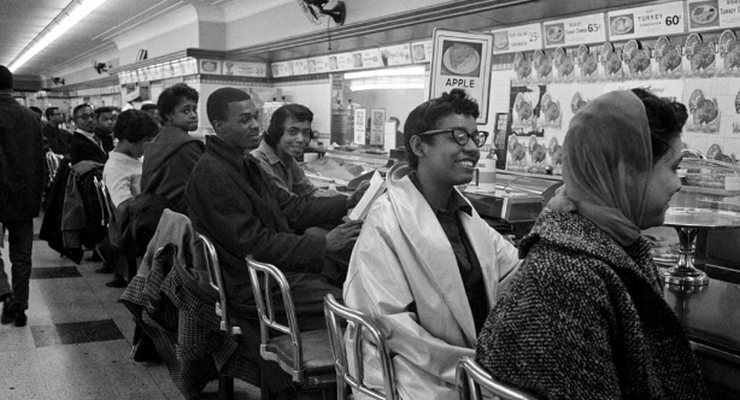
Angeline Butler participated in the Nashville, Tennessee sit-ins in 1960 as a Fisk University student and was arrested. The sit-ins, which lasted from February 13 to May 10, 1960, aimed to desegregate lunch counters. The campaign was among the earliest non-violent direct action campaigns in the South. [Courtesy U.S. Library of Congress (00651469)]
What is not known by many is that aside from being a performing artist, Butler is also an icon of the Civil Rights Movement.
A student organizer back in the 1960s, Butler was 17 years old when she was arrested for sitting at the lunch counter at McLellan’s five-and-ten-cent store in Nashville, Tennesse as part of a protest to end racial segregation at lunch counters.

Angeline Butler was featured on the cover of Jet Magazine, Jan. 25, 1968.
Butler, who currently teaches at the John Jay College of Criminal Justice in New York City, was a student advisor to the Late Martin Luther King, Jr. and an organizer of the 1963 March on Washington for jobs and freedom. The movement, joined by over 250,000 people, was one of the most significant protests in American history.
Speaking to Pasadena Now, the activist shared her reflections of the strategy and accomplishments of the Student Nonviolent Movement of the 1960’s.
“If it weren’t for a student movement, there wouldn’t have been no March in Washington,” she said, as she recalled the events that transpired during the protest.

Butler currently teaches at the John Jay College of Criminal Justice in New York City.
“We were the ones who had brought national attention to the need to have a march on Washington. We were the ones who had basically raised all audiences there,” she added.
Butler contrasted how recent protests differ from the unrest in the 1960s.
In the 1960s, she said protesters went out literally on the streets and worked with the community on a daily basis.
“We were working on a community project on the weekend, because that’s nonviolence too.n [We were helping] people build stuff and we were walking door to door trying to get people to register and vote.”
“We were doing something almost every day in our spare time.”
Butler stressed if people wanted change then they must go out to the community and help people with their struggles everyday.
“You have to have something that you are building or a goal to what it is you want to accomplish, not just have people respond to the fact that someone got killed and it was police brutality in that situation. And now you email thousands of people and they show up for a demonstration. We need you doing that every day.”
“We need you in training workshops. We need you in the community talking to people. We need you in the churches. That’s where most people are. We need you in the schools, we need you organizing.”
Butler said she does not support the use of personal insults and curse words during protests.
“There has to be a way to deal with the establishment and not verbal threats. What we used to do was we would call economic boycott, which meant we would take their money away from them.”
“We would boycott the products, we would boycott the store, the corporation. Coca-Cola, Pepsi Cola,” she recalled.
She explained that in her view, foul language is not acceptable language when trying to change something for the benefit of the larger population.
“What’s the point of you going to school if that’s how you have to express yourself? There has to be a way that you communicate with the public and still get your point across and move people to do things without all of the profanities,” she said.
Butler will speak more about her experiences as a student organizer in the 1960s in “Lift Every Voice: An Evening with Angeline Butler, a Powerful Voice of the Civil Rights Movement” at Hastings Branch Library on Feb. 16 at 6 p.m.
Participants will have the opportunity to ask questions.
The event can also be accessed through Zoom. To sign up, visit: https://pasadena.evanced.info/signup/EventDetails?EventId=7298






